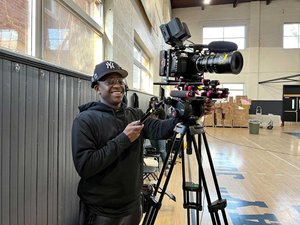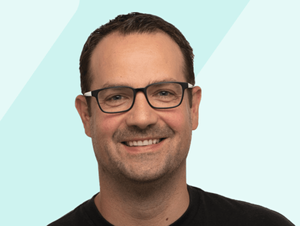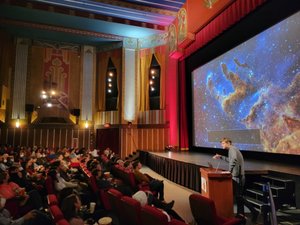The facts and figures surrounding the lack of women in tech are anything but hidden. According to recent McKinsey research, companies in the top quartile for gender diversity are 15 percent more likely to financially outperform organizations in the bottom quartile. Yet, at the same time, women still hold 25 percent of all computing occupations as of 2015, a report from the National Center for Women and Information Technology reads.
Thursday evening, Wayfair hosted a screening of Code: Debugging the Gender Gap at its Copley Place office. Prior to the documentary, the e-commerce company invited a select group of tech professionals to a private discussion about gender diversity within the industry.
I sat in on that conversation. The participants were Christina Aiello, software engineer at Cimpress/Vistaprint; Emily Batt, senior product manager at Kayak; Lindsey Bleimes, associate director of engineering at Wayfair; Erin DeCesare, vice president of technology at Cimpress; Jeremy Delinsky, chief technology officer at Wayfair; Kristin Rizzo, associate director of engineering at Wayfair; and Zoe Sobin, senior software engineer at HubSpot.
And throughout the duration of the intimate roundtable, these technical professionals shared their personal experiences of the past and how see they see the industry changing for women in tech in the future. Here are my four takeaways from what they had to say.
Boston isn't riddled with overt sexism, from their experiences.
Aiello: I’ve had a lot of experiences where people just don’t expect me to be an engineer… Apparently I have to wear Javascript on my clothing and circuit board earrings to prove I’m an engineer. The nice thing, I’d say, is no one ever says, “That’s not possible,” when I tell them I’m an engineer. From what I’ve seen, people hear it and are surprised, but surprised in a positive way.
Boston seems different in that the idealism of students seems to follow people into their professional lives here.
Rizzo: We haven’t, or I haven’t, experienced anything overt. But once we started this women in tech group… I started picking up things like why do people act surprised? Why do people turn to me and ask, “What do you do?” when I’m with my team. I find that happens a lot. I’m the manager of my team, but I’ll be giving an interview with a male about a report of mine and the person will turn to the guy as if they were the manager. But it’s never ill-intentioned so it’s often hard to pick up on.
Our city's tech culture is more of a meritocracy.
Delinsky: Boston seems different in that the idealism of students seems to follow people into their professional lives here. I find that the teams are very hard working--people are in early, they’re in late--and there’s this commitment to meritocracy and fairness that’s different. With every team I’ve managed here in Boston, that’s been a really important thing… Engagement in the work and enjoying the journey seem to be a much higher priority here than in other cities.
"Agile" has paved the way for women to be successful.
I think it’s creating a lot of opportunities for women to shine.
DeCesare: I’ve found that the shift toward Agile has opened up doors to recognize how females can bring something different to the table. I will credit some of my major career changes to male managers who couldn’t adapt to the expectations of servant leadership and that the role of the manager was not dictating, but rather giving space for the team to thrive. It’s a bit of a gender bias to say that we’re better at that, but, we are better at that. It’s great as an industry that that concept of management is being embraced and held up as the gold standard. I think it’s creating a lot of opportunities for women to shine.
We need to change how young women perceive software engineers.
Aiello: I worry that men and women, especially women, don’t realize that computer science isn’t about a nerd in a closet with a laptop, with the lights off, and you can throw them a pizza and a bottle of Mountain Dew so coding magic happens. It’s not that. If you’re not talking to people at some point in your day, you’re probably not doing software right, at least in terms of agile… It’s not what it used to be. It’s collaborative.
Just don’t go to San Francisco, but you should still be in tech.
Batt: I never expected to end up in the tech field. I had huge misconceptions about what it meant to be an engineer and to be technical. That sent me on a few detours. I think that’s part to the root of the problem, that we need to make sure young people understand what the industry looks like. There are lots of different roles within the industry, and I just had this vision of an engineer with drafting paper. Who does that?
Boston needs to show young women we're not like the Valley.
Bleimes: How many people have watched Silicon Valley? And how many people have commented that that show is on point? But I don’t feel that way here in Boston. How many news stories are there about some tech giant in Silicon Valley who’s a jerk? And you don’t hear that here. But if that’s the picture of engineering in the media and that’s all you knew, why would you want to be a part of that? Just don’t go to San Francisco, but you should still be in tech.








